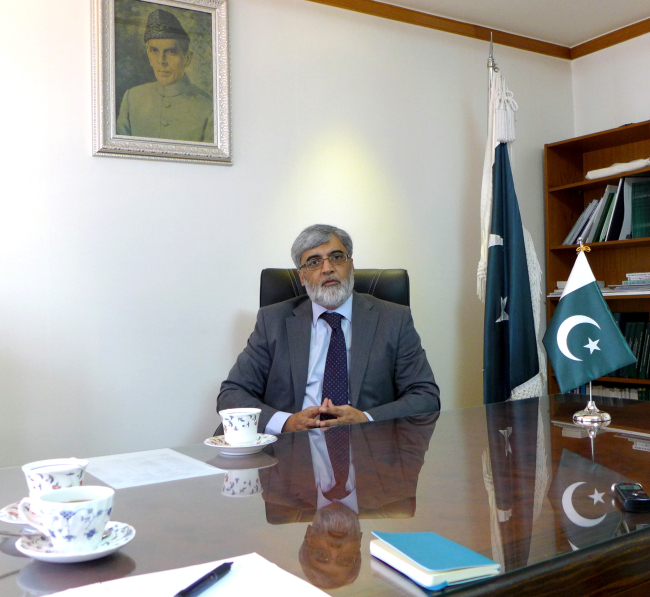Pakistan and Korea are striving to launch a free trade agreement following an ongoing feasibility study, hoping to capitalize on each other’s geostrategic leverage, Pakistan’s top envoy to Korea said.
In an interview with The Korea Herald in early February, Pakistani Ambassador Zahid Nasrullah Khan highlighted the policy of prioritizing trade and investment with Korea since Prime Minister Nawaz Sharif took office in June 2013.
The feasibility study, being conducted jointly by the Pakistan Institute of Trade and Development and the Korea Institute for International Economic Policy since July 2015, is expected to be completed by June and followed by early rounds of negotiations.
Following agreements with China, Malaysia and Sri Lanka, Islamabad aims to strike a deal with Seoul, which would be the first of its kind with a member economy of the Organization for Economic Cooperation and Development.
“As the Korean economy is undergoing structural changes with low-value-added industries outsourced overseas, Korean companies could base their operations in Pakistan in this segment of manufacturing,” Khan said. “Pakistan has comparative advantages in textiles, cotton and leather goods over other competing countries.”
Noting that Pakistan’s geostrategic location presents “many opportunities as well as challenges,” the envoy mentioned Iran just got off the yoke of international sanctions and western China remained underdeveloped. He also noted that Afghanistan was unstable and tensions persisted in Jammu and Kashmir along the border with India.
According to the embassy, Islamabad has embarked on an ambitious connectivity project with Beijing to link the two countries through the China-Pakistan Economic Corridor, which would open up trade routes to Central Asia and the Eurasian continent.
The initiatives include transporting electricity from Tajikistan and Kyrgyzstan as well as natural gas through the Trans-Afghan Pipeline connecting Turkmenistan, Afghanistan, Pakistan and India. Construction began in Turkmenistan in December last year and it is expected to be operational by 2019.
Furthermore, the Gwadar Port in southwestern Pakistan on the Arabian Sea would open access to Afghanistan, Turkmenistan, Uzbekistan, Kyrgyzstan and Kazakhstan, as well as China’s northwestern territories, for heavy cargo.
Seoul has recently scaled up contributions to the economic development cooperation fund from $180 to $500 million, under which the Korea Eximbank has agreed to establish an information and communications technology park in Islamabad. A government-to-government project with anticipated investments by Korean firms, the scheme is worth over a million dollars.
According to the ambassador, the project’s spirit is to emulate the success of ICT parks in Korea. A feasibility study will be completed in March, the project loan will be signed off in June and construction may start by the end of this year.
On the political front, Pakistan’s prime minister and Korean President Park Geun-hye held a meeting on the sidelines of the 70th session of the U.N. General Assembly in September last year.
“The two leaders affirmed their resolve to improve bilateral relations over broad areas, with a focus on commerce, the bedrock of our relationship.”
More recently, the ninth bilateral policy consultation session was held in Islamabad with the participation of Korea’s First Vice Foreign Minister Lim Sung-nam. The two sides exchanged views over state affairs, trade and investment, energy and transportation, defense, development cooperation, regional situations, terrorism, nuclear threats, collaboration on international stages, education, labor and agriculture.
“Reaffirming that our relationship is on the right footing,” the ambassador stressed, “They discussed upgrading the policy consultation to a strategic level.”
The two countries also signed a memorandum of understanding for the Pakistan-Korea Joint Trade Commission in July last year, during the visit of Pakistan’s Commerce Minister Khurram Dastgir Khan to Seoul.
Regarding the recent waves of terrorist attacks, which have rocked Pakistan and shocked the world, the diplomat claimed they were part of attempts to offset the military’s counterterrorism efforts in the northern areas since June 2014, which drove the Taliban out of Pakistan and into Afghanistan.
A “complete consensus” now exists across the country to root them out under the National Action Plan, he said, adding that his government has made concerted efforts to expunge hatemongering at mosques, religious extremism and the guerillas’ logistics and financial networks.
“The Taliban are attacking ‘soft targets’ like schools, universities and hospitals, rather than urban centers like Lahore or Karachi,” Khan said. “As long as Afghanistan remains unstable as a sanctuary for terrorists, we can expect such attacks. Afghanistan’s southeastern areas are currently not under government control.”
To counter the threat, a quadrilateral framework involving China, the U.S., Pakistan and Afghanistan was initiated at the end of last year to promote reconciliation between the Afghan government and Taliban and restore durable peace to the region, he added.
By Joel Lee ([email protected])


